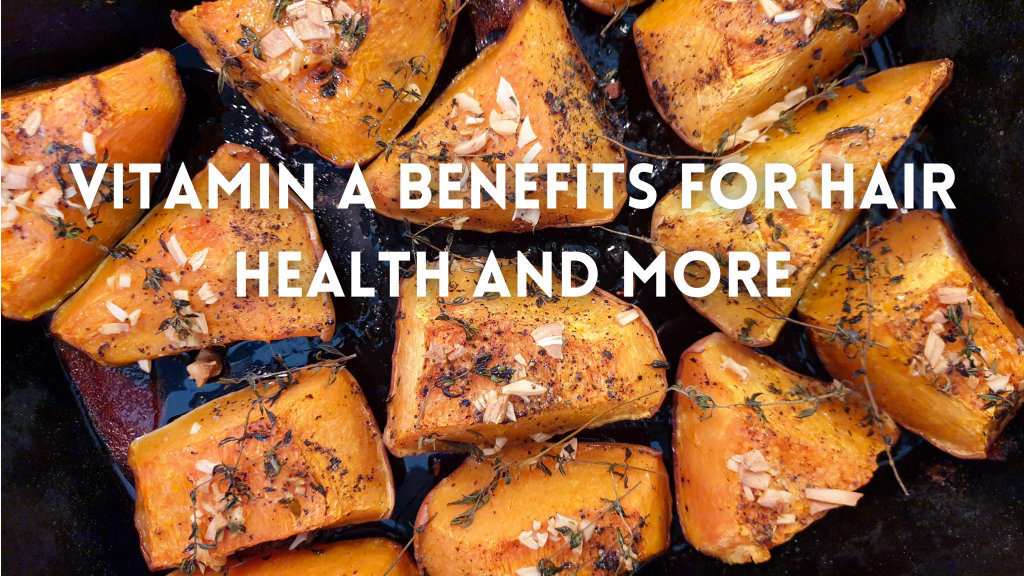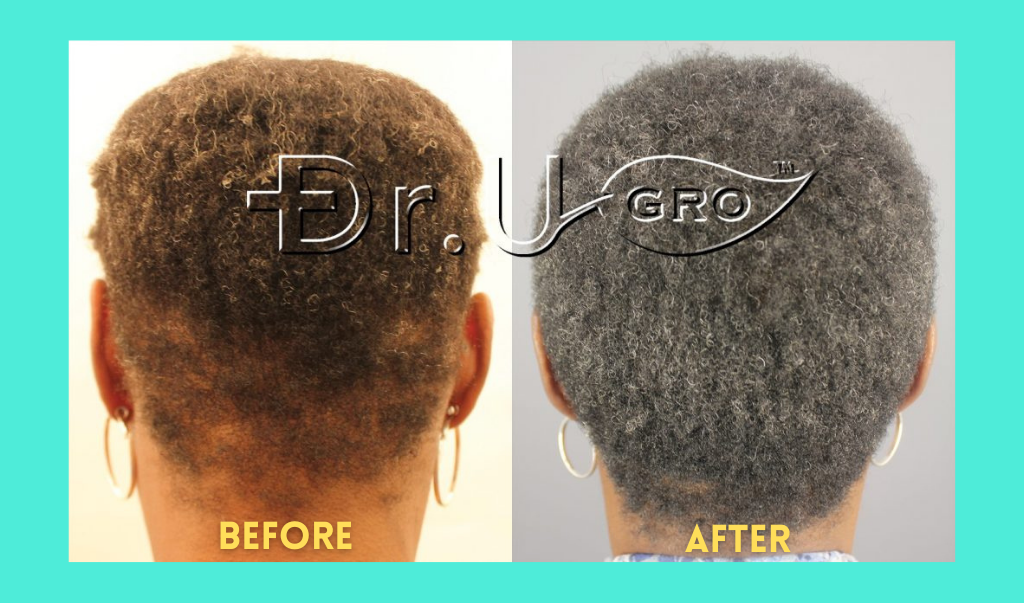Published on November 3, 2021. Last Updated on December 2, 2021.
What is Vitamin A: First discovered in 1909, Vitamin A, also known as retinol, or vitamin A1, is a fat-soluble vitamin found in foods and dietary supplements. Vitamin A can be found in fish, dairy products, and meat. Besides being essential for skin, cellular growth and differentiation, immune system health, and vision, vitamin A is also necessary for hair growth and hair health. In fact, not having enough vitamin A can lead to hair loss and even blindness. Learn more about vitamin A benefits for hair and other important information regarding vitamin A for optimal hair growth below.
Vitamin A Health Benefits
Having enough vitamin A in your diet is critical to your health. Having insufficient vitamin A in your diet could lead to hair loss, skin problems, dry eyes, night blindness, and increased susceptibility to infections. Therefore, some vitamin A benefits for health include:
- Protects eyes from night blindness
- Helps preserve eyesight
- May lower risk of certain cancers
- Support the immune system
- Reduces risk of acne
- Support bone health
- Promote healthy growth and reproduction
Some of these benefits are due to vitamin A’s role in cellular production and differentiation – and hair growth is no different. Therefore, vitamin A has many benefits for hair growth as well.
Vitamin A Benefits for Hair Growth

All cells within the human body need vitamin A to grow – including hair cells. As mentioned before, not having enough vitamin A or retinol in your diet could lead to hair loss. While having enough vitamin A is essential to stop hair loss, having enough or plenty of vitamin A can also help optimize the hair’s beauty and health. Some vitamin A benefits for hair include:
- Helps maintain hair health
- Helps new hairs grow
- Helps moisturize scalp and hair
Vitamin A not only helps create new hair cells, but it also helps the body produce sebum. Sebum helps moisturize the scalp, and a moisturized scalp helps keep the hair healthy and moisturized and free from split ends, dry hair, or breakage.
Can Vitamin A Induce Hair Loss?
Although having enough vitamin A in your body is critical in creating and promoting hair growth, too much vitamin A can also lead to hair loss. Therefore, a healthy balance of vitamin A around recommended dosages is needed to help optimize hair health and hair growth.
But Exactly How Much Vitamin A Induces Hair Loss?
In a 2018 study titled “The Role of Vitamins and Minerals in Hair Loss: A Review,” researchers state how “consuming too much or over-supplementing vitamin A can cause hair loss.”
To expand on this, the researchers brought up a case of a “28-year old woman undergoing renal dialysis” who reported a sudden hair loss. Upon further investigation, researchers found that “she had been taking a daily vitamin A supplement (5,000 IU) and that her vitamin A serum levels were well above normal. One month after the termination of vitamin A supplementation, “hair loss was no longer a problem.”
Therefore, as long as you are taking underneath the maximum dosage of vitamin A, closer to the recommended dosages of vitamin A shown below, vitamin A supplementation should not cause you any hair loss. In fact, vitamin A should help you achieve stronger, healthier-looking hair.
Recommended Dosage of Vitamin A
As stated by Healthline, the “recommended dietary allowance (RDA) of vitamin A or retinol is 900 mcg for men, 700 mcg for women, and 300-600 mcg for children and adolescents.” This is a suitable RDA for most people, and following these recommended dosages should lead to healthier, stronger hair and perhaps some induced hair growth or a possible case of hair restoration.
As for the maximum tolerable upper intake level (UL) of vitamin A (retinol), Wikipedia states 3,000 mcg per day or about 10,000 IU. Yet, suppose you are taking vitamin A for hair health or general health. In that case, it is best not to go anywhere near this excessively high amount and stick to the recommended RDA mentioned previously instead.
Possible Side Effects of Vitamin A
However, it is critical to note that Wikipedia also states that “even twice the daily recommended amount can cause severe birth defects for pregnant mothers.” Furthermore, “these defects may be severe, even life-threatening.”
In the case of pregnant women, the FDA recommends that pregnant women get their vitamin A from foods containing beta-carotene (plant-based vitamin A) and to ensure that they consume no more than 5,000 IU of preformed vitamin A per day.” In this case, it is recommended not to take any vitamin A supplements and to limit vitamin A intake from foods.
Vitamin A (Retinol) Safety Profile
According to the EWG, vitamin A (retinol) scores a 9 on its safety score sheet, which states that it has little to moderate cancer hazard, high developmental and reproductive toxicity hazard, and little-to-none allergies and immunotoxicity hazard.
It should be noted that this is due to the EWG’s research and findings of the photocarcinogenic properties of vitamin A in several sunblocks and skin products – as too much of vitamin A applied on the skin, combined with the sun’s UV rays, can possibly lead to skin growth or skin cancers.
Otherwise, if taken under the recommended dosages outlined above, vitamin A (retinol) is healthy and safe to take, whether for overall body health or hair growth, to combat hair loss, or for possible hair restoration.
To further support vitamin A (retinol)’s safety taken as an oral supplement, Wikipedia states that “retinol at normal doses is well tolerated.”
More so, it is essential to note that there are 2 types of vitamin A available: Vitamin A1, also known as retinol, and Provitamin A, also known as carotenoids.
What Are the 2 Types of Vitamin A? Vitamin A1 (Retinol) vs Provitamin A (Carotenoids) Differences Explained
In short, vitamin A1 (retinol) is naturally found from animal sources only. It is readily digestible by the body into usable vitamin A.
On the other hand, provitamin A (carotenoids) is a “precursor” to vitamin A ground from plant foods. Carotenoids are found in plant foods such as sweet potato, winter squash, carrots, and more. Once the body digests the carotenoids, the carotenoids turn into usable vitamin A for the body to use. Specifically, carotenoids include “beta-carotene and alpha-carotene,” collectively known as provitamin A.
However, it is important to note that about “45% of people carry a genetic mutation that significantly reduces their ability to convert provitamin A into vitamin A.”
Due to these factors, vegetables high in provitamin A may actually supply the body less vitamin A, as shown on the DV percentages, depending on your specific body and genetic patterns.
Suppose you want to be safe and ensure that you have enough readily available and usable vitamin A for your body. In that case, it may be a good idea to opt for animal foods high in vitamin A1 (retinol) or use a retinol-based vitamin A oral supplement instead.
What is Vitamin A1 (Retinol)?

Vitamin A1, also known as retinol, is a naturally occurring type of vitamin A only found in animal-sourced foods such as oily fish, liver, cheese, and butter.
Foods High in Vitamin A1 (Retinol)
Some sources of vitamin A1, listed in order of highest DV per serving to lowest, can be seen listed here:
- Beef Liver (713% DV per serving)
- Lamb Liver (236% DV per serving)
- Liver Sausage (166% DV per serving)
- Cod Liver Oil (150% DV per serving)
- King Mackerel (43% DV per serving)
- Salmon (25% DV per serving)
- Bluefin Tuna (24% DV per serving)
- Goose Liver Pate (14% DV per serving)
- Goat Cheese (13% DV per serving)
- Butter (11% DV per serving)
- Limburger Cheese (11% DV per serving)
- Cheddar (10% DV per serving)
- Camembert (10% DV per serving)
- Roquefort Cheese (9% DV per serving)
- Hard-Boiled Egg (8% DV per serving)
- Trout (8% DV per serving)
- Blue Cheese 6% DV per serving)
- Cream Cheese (5% DV per serving)
- Caviar (5% DV per serving)
- Feta Cheese (4% DV per serving)
What is Provitamin A (Carotenoids)?
On the other hand, provitamin A, also known as carotenoids, can only be found from plant-based sources such as fruits and vegetables. More so, these carotenoids have to be converted into usable vitamin A by the liver once digested – and as noted previously, 45% of people carry a genetic mutation that significantly reduces their ability to convert provitamin A into vitamin A.
With all this in mind, getting your vitamin A from provitamin A, AKA carotenoids, may still be a viable option if you are not genetically dispositioned against provitamin A conversion or if you follow a diet that does not partake in animal-based foods. If this is the case, it is also recommended to supplement your diet with retinol-based oral vitamin A supplements to achieve maximum hair health.
Foods high in Provitamin A (Carotenoids)
As opposed to vitamin A1, carotenoids or provitamin A can only be found from plant-based sources such as fruits and vegetables. Vegetables tend to have higher concentrations of provitamin A, but there are also some fruits with a high concentration of provitamin A. Some sources of provitamin A, listed in order of highest DV per serving to lowest, can be seen listed here:
- Sweet Potato (204% DV per serving)
- Winter Squash (127% DV per serving)
- Kale (98% DV per serving)
- Collards (80% DV per serving)
- Turnip Greens (61% DV per serving)
- Carrots (44% DV per serving)
- Sweet Red Pepper (29% DV per serving)
- Mango (20% DV per serving)
- Cantaloupe (19% DV per serving)
- Pink or Red Grapefruit (16% DV per serving)
- Swiss Chard (16% DV per serving)
- Spinach (16% DV per serving)
- Romaine Lettuce (14% DV per serving)
- Watermelon (9% DV per serving)
Harness The Vitamin-A Infused Power of Dr.UGro All-Natural GASHEE Oral Hair Supplements
Vitamin A in the form of Retinyl Cetate or Retinol, as well as other natural ingredients essential to hair growth, are among the many powerful plant-based ingredients found in Dr.UGro Gashee Oral Hair Supplements. Gashee Oral Supplements have been carefully formulated with the most effective dosage of vitamin A and other vitamins, minerals, and ingredients to help maximize vitamin A’s effects on your hair growth and hair health. To help increase the feel and appearance of hair density, thickness, and volume, or to help regrow hair loss or aid hair growth, take 4 capsules a day.
VIDEO: Dr. UGro Gashee Topicals: Before & After Results
Hair loss can happen due to the effects of aging, time, and even stress. Our hair health depends on all of these factors, and sometimes a combination of these factors can lead to detrimental hair health, resulting in hair loss, hair thinning, or more.
If you happen to experience symptoms of hair loss, alopecia, hair thinning, hairline recession, or any other hair-health-related issues, you may be able to relate with Diane’s story and how she was able to overcome these struggles in her hair health, using Gashee Natural Oral Supplements and Topical Pomade Botanical for hair health.
Meet Diane: For Diane, a combination of consecutive tragic events and passings in her close family had possibly attributed to her hair loss. Facing these tough mental and emotional challenges have seemed to “taken a toll” on her, according to her husband, and after a noticeable decrease in the quality and texture of her hair, as well as a range of other related hair loss symptoms, it was time for Diane to search for a viable solution for her hair health.
Some of the symptoms of hair loss that she had to deal with include:
- Decrease in quality of hair
- Decrease in quality of hair texture
- Patchy hair
- Frail hair
- Sparse hair
- Parts of scalp exposed
- Lack of volume on edges & temples
The Beginning of Diane’s Journey in Recovering Her Hair Health
Diane’s first few steps towards her eventual hair health recovery first began with a meeting with Dr. U, also known as Dr.UGro, originator of the Dr.UGro GASHEE Natural Hair Product line. As Diane told Dr. U about her concerns, of how some of her hair had gone, and thinned out, of how her scalp had begun to show exposed patches, and of her decreasing volume and density of hair, Dr. U had proposed a simple solution for her.
Below, you can watch a video testimonial of Diane’s personal successes and experience with Gashee Pomade and Oral Supplements, and how they have helped her in her journey towards better hair health.
Dr. UGro Gashee: Before & After Pictures – Hair Health Improvement Results
In a few months’ time, Diane was able to already see, feel, and notice a considerable difference in her hair health, thickness, and volume. The growth was remarkable. Dr. UGro Gashee’s natural hair growth results: before and after several months of consistent usage. Note how in Diane’s case, there is a remarkable improvement in the fullness, length, texture, sheen, shine, and visual health of her hair.

What an amazing feeling it was for Diane to see and feel her hair growing back fuller! After trying multiple products previously that did not work for her hair and her hair health, it was a completely refreshing feeling to be able to finally find a product that worked well for her hair and situation. According to Diane, “there was a striking difference in her hair in comparison to pictures she’d taken before using the products.”
“There was a striking difference in my hair in comparison the [what it was] before using Dr.UGro Gashee Natural Hair Health Products!”
“It has changed my life.”
“It has changed my life,” Diane said with a smile. “In terms of how I see myself and how I am confident in appearing in the outside world.”
For more of Diane’s personal testimonial, of her story, her results, and her happiness and satisfaction with Dr. UGro GASHEE Natural Hair Growth Products, visit Diane’s full interview here.
What Makes Dr.UGro Gashee Hair-Growth Products Different
Dr. UGro Gashee Products are uniquely formulated by Dr. Sanusi Umar, a double-licensed dermatologist, and pioneer of the FUE hair transplant method with over 25 years of experience in the field.
Unlike other hair health and hair improvement products in the market, Dr. UGro Gashee Products uses a powerful blend of natural plant-based ingredients that have been cold-formulated to maximize each plant’s unique properties, delivery, and penetration, combining them to stimulate different pathways and functions within the body to maximize hair health. This is why GASHEE Products have been able to deliver hair health improvements with more significant results than other medicines, treatments, prescribed or over-the-counter.
If you are tired of trying products that do not help improve hair health and want to try an all-natural and healthy approach to improving your hair health, try our Dr. UGro Gashee All-Natural Hair Care Products today!
Related Articles on Hair Loss & Hair Health
For additional information regarding hair loss and hair health-related ingredients that you may find useful, visit the new articles below.
References
- Healthline. 2021. The 5 Best Vitamins for Hair Growth. [online] Available at: <https://www.healthline.com/nutrition/best-vitamins-hair-growth#TOC_TITLE_HDR_2> [Accessed 3 November 2021].
- Almohanna, H., Ahmed, A., Tsatalis, J. and Tosti, A., 2021. The Role of Vitamins and Minerals in Hair Loss: A Review.
- Healthline. 2021. 20 Foods That Are High in Vitamin A. [online] Available at: <https://www.healthline.com/nutrition/foods-high-in-vitamin-a> [Accessed 3 November 2021].
- EWG. 2021. EWG Skin Deep® | What is RETINOL (VITAMIN A). [online] Available at: <https://www.ewg.org/skindeep/ingredients/706889-retinol_(vitamin_a)-RETINOL_VITAMIN_A-RETINOL_VITAMIN_A-RETINOL_VITAMIN_A-RETINOL_VITAMIN_A/> [Accessed 3 November 2021].
- Sunscreens, E., 2021. EWG’s Guide to Safer Sunscreens. [online] Ewg.org. Available at: <https://www.ewg.org/sunscreen/the-problem-with-vitamin-a/> [Accessed 3 November 2021].
- En.wikipedia.org. 2021. Retinol – Wikipedia. [online] Available at: <https://en.wikipedia.org/wiki/Retinol> [Accessed 3 November 2021].



